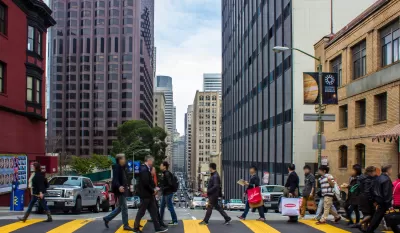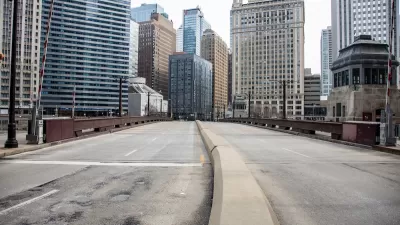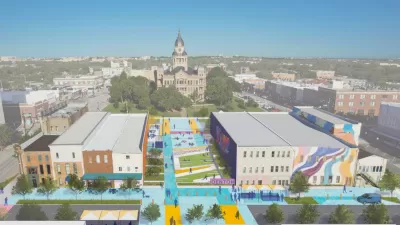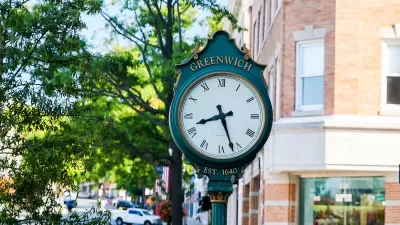Traditionally car-friendly Business Improvement Districts are turning to walkability and bike infrastructure to replace the 9-to-5 crowd and boost local economies.

In a piece for Bloomberg CityLab, John Surico describes the historically car-oriented politics of Business Improvement Districts (BIDs), business groups that emerged in the 1970s as a response to declining downtown conditions. “Historically, BIDs also typically favored access for cars, prioritizing suburban commuters and visitors with amenities like parking discounts and public lots. Indeed, the built environment of the American downtown — a ‘precarious urban monoculture’ optimized for white-collar work — is one that these groups helped cement into being.”
Now, “it’s striking to see the same groups now bang the gong for bike lanes, vehicle bans and pedestrian-focused facelifts. Reeling from the rise of remote work and the ongoing effects of the Covid pandemic, business groups are embracing policies and practices they long shunned.”
While not all BIDs are changing their views, many in the country’s biggest cities are recognizing the value of pedestrian and bicycle traffic and reorienting their efforts to new downtown residents and visitors in the post-pandemic era. “The paradigm shift that’s now underway could pay big dividends for walkability boosters — and be crucial to the survival of the urban core.”
“It took decades to create the modern office district; now that its critical vulnerabilities have been exposed, adapting these neighborhoods to again welcome a more diverse set of uses stands to be a similarly prolonged process.” Surico points out that BIDs, with their significant influence and resources, can be a key partner in creating more livable, walkable downtowns.
FULL STORY: As Downtowns Struggle, Businesses Learn to Love Bike Lanes

Montreal Mall to Become 6,000 Housing Units
Place Versailles will be transformed into a mixed-use complex over the next 25 years.

Planetizen Federal Action Tracker
A weekly monitor of how Trump’s orders and actions are impacting planners and planning in America.

DARTSpace Platform Streamlines Dallas TOD Application Process
The Dallas transit agency hopes a shorter permitting timeline will boost transit-oriented development around rail stations.

Without International Immigrants, the Rural US Population Would Be Falling 58%
Census data shows that population growth in rural areas is due in large part to international migrants.

Dead End: Nine Highways Ready for Retirement
The Freeways Without Futures report describes the nation’s most promising highway removal proposals.

Congressman Proposes Bill to Rename DC Metro “Trump Train”
The Make Autorail Great Again Act would withhold federal funding to the system until the Washington Metropolitan Area Transit Authority (WMATA), rebrands as the Washington Metropolitan Authority for Greater Access (WMAGA).
Urban Design for Planners 1: Software Tools
This six-course series explores essential urban design concepts using open source software and equips planners with the tools they need to participate fully in the urban design process.
Planning for Universal Design
Learn the tools for implementing Universal Design in planning regulations.
City of Mt Shasta
City of Camden Redevelopment Agency
City of Astoria
Transportation Research & Education Center (TREC) at Portland State University
City of Camden Redevelopment Agency
Municipality of Princeton (NJ)
Regional Transportation Commission of Southern Nevada





























